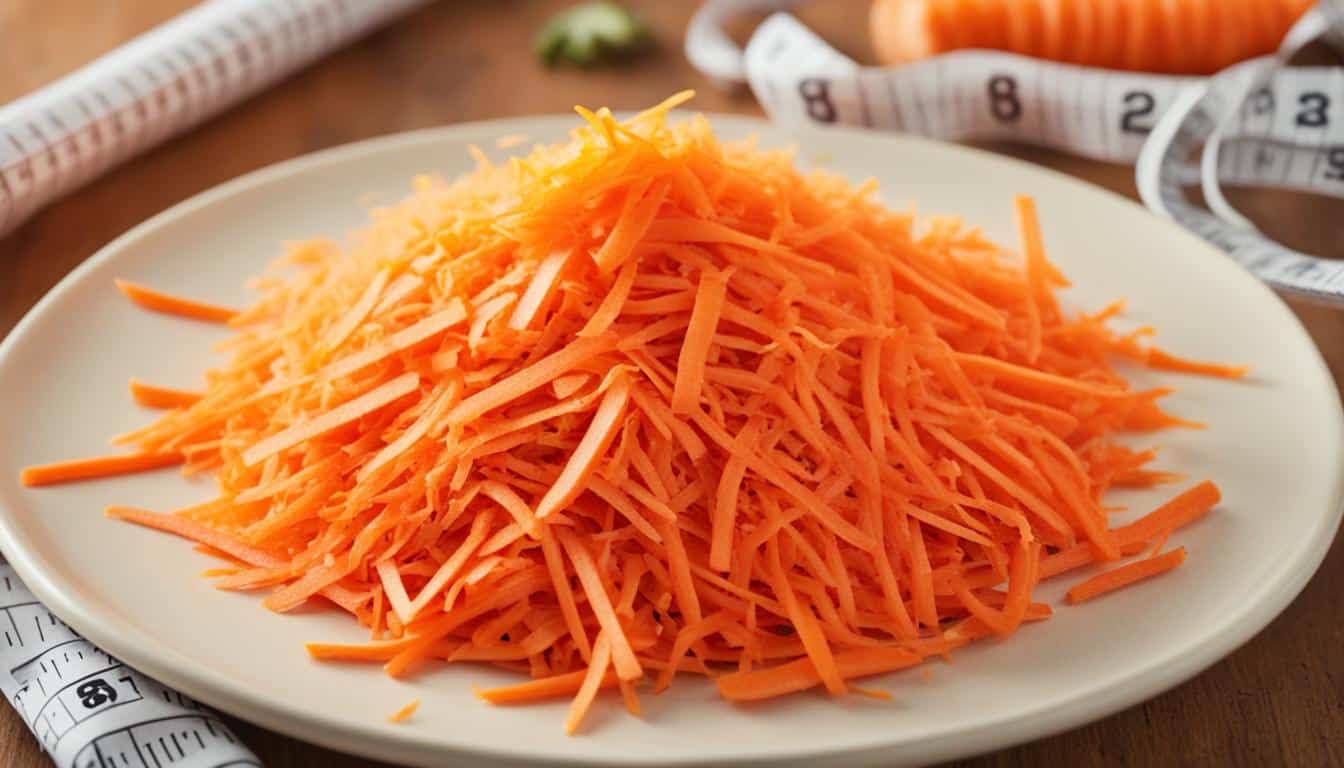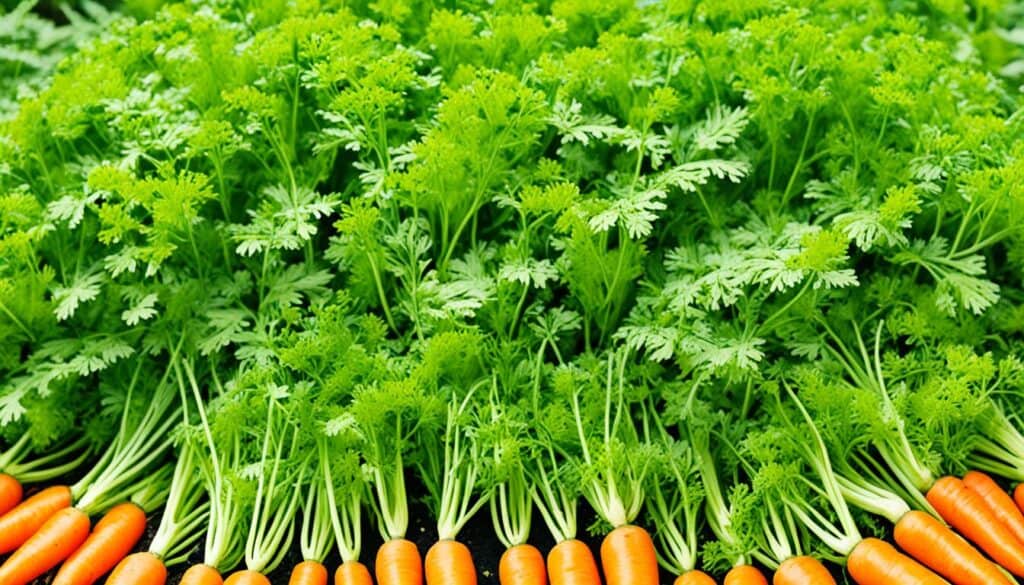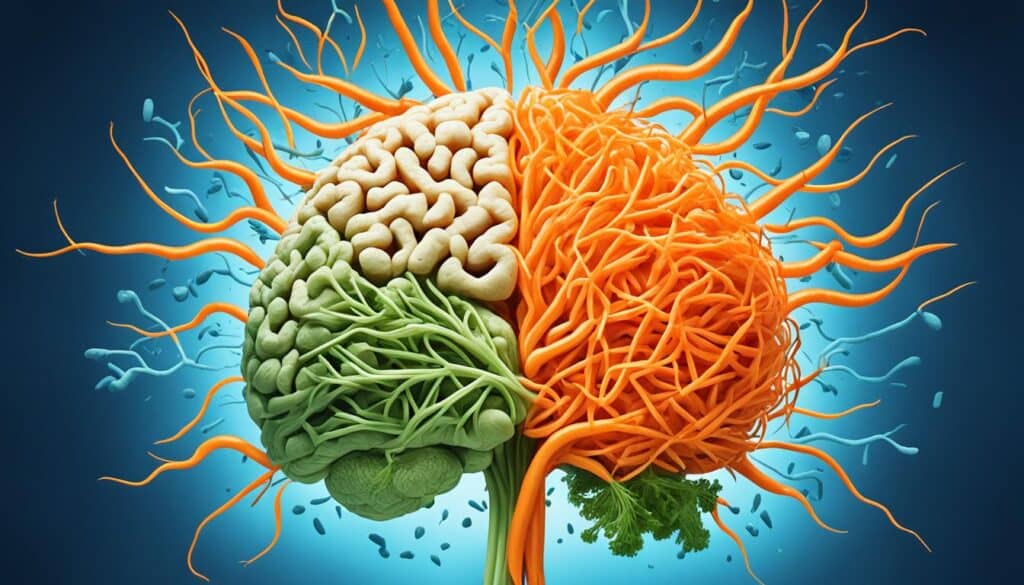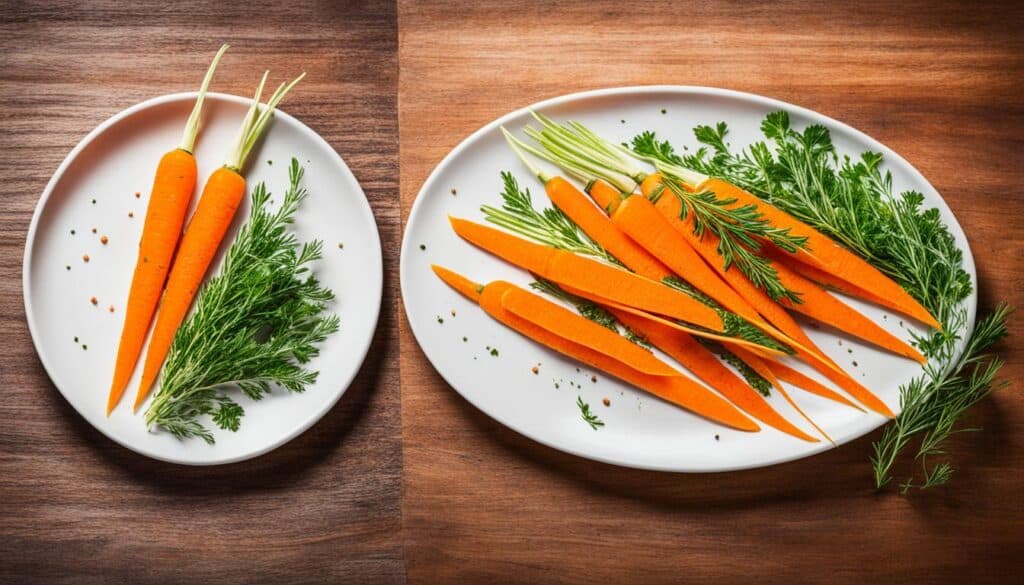Did you know that just one cup of shredded carrots can provide over 400% of your daily recommended intake of vitamin A? Carrots are not only delicious but also incredibly nutritious, packed with essential nutrients that can benefit your overall health. From salads to stir-fries, there are countless ways to incorporate shredded carrots into your meals and boost your well-being.
Key Takeaways:
- Shredded carrots are a versatile and nutrient-rich ingredient that can enhance your overall health.
- Carrots are packed with essential nutrients, including beta-carotene, fiber, and antioxidants.
- Including shredded carrots in your diet can support eye health, weight management, immune function, and heart health.
- Both raw and cooked shredded carrots offer unique benefits.
- Explore delicious recipes and creative ways to enjoy shredded carrots, from salads to desserts.
The Power of Carrots for Optimal Health
Carrots offer a wide range of health benefits. They are rich in beta-carotene, which gets converted to vitamin A in our bodies. Vitamin A is essential for maintaining good vision, reducing the risk of macular degeneration, and promoting healthy skin.
Carrots also contain fiber, which aids in digestion and helps regulate blood sugar levels. Additionally, the potassium in carrots supports cardiovascular health by balancing sodium levels.
Adding carrots to your diet can provide the following health benefits:
- Eye Health: Carrots are known for their role in promoting good vision and reducing the risk of age-related macular degeneration.
- Skin Health: The high vitamin A content in carrots helps maintain healthy skin by supporting cell regeneration and preventing dryness.
- Digestive Health: The fiber in carrots aids in digestion, promotes regular bowel movements, and supports a healthy gut.
- Cardiovascular Health: The potassium content in carrots helps maintain healthy blood pressure levels and supports heart health.
- Blood Sugar Control: Carrots have a low glycemic index, which means they have a minimal impact on blood sugar levels and can be included in a balanced diet for those with diabetes.
“Incorporating carrots into your diet is a delicious and nutritious way to support overall health and well-being.” – Dr. Samantha Simpson
With their numerous health benefits and delicious taste, carrots are a versatile vegetable that can be enjoyed in various dishes, from salads and soups to stir-fries and smoothies.
The Health Benefits of Carrots at a Glance
| Health Benefit | Description |
|---|---|
| Eye Health | Carrots are rich in beta-carotene, which helps maintain good vision. |
| Skin Health | Vitamin A in carrots promotes healthy skin by supporting cell regeneration. |
| Digestive Health | The fiber content in carrots aids in digestion and promotes a healthy gut. |
| Cardiovascular Health | Carrots’ potassium content supports heart health and helps balance blood pressure levels. |
| Blood Sugar Control | Carrots have a low glycemic index and can be included in a balanced diet for blood sugar control. |
Carrots for Weight Management
When it comes to weight management, carrots can be your best ally. These vibrant vegetables are not only low in calories but also high in fiber, making them an ideal addition to your diet. Their unique combination of low-calorie content and high-fiber content can help promote satiety and prevent overeating.
Fiber is essential for maintaining a healthy weight as it provides a feeling of fullness, helping you stay satisfied and reducing the temptation to snack on calorie-dense foods. By incorporating carrots into your meals or enjoying them as a snack, you can curb your hunger and support your weight loss journey.
A study published in the Journal of the American College of Nutrition found that individuals who included carrots in their diet had a lower body mass index (BMI) compared to those who didn’t consume carrots regularly. These findings suggest that carrots could play a role in preventing obesity and promoting weight loss.
So, why are carrots effective for weight management? Let’s take a closer look at their nutritional profile.
| Nutrient | Amount per 100g |
|---|---|
| Calories | 41 |
| Fiber | 2.8g |
| Sugars | 4.7g |
As you can see from the table, carrots are relatively low in calories, making them a smart choice for weight-conscious individuals. Additionally, their high fiber content contributes to a longer-lasting feeling of fullness, preventing excessive snacking and promoting portion control.
Next time you’re planning your meals or reaching for a snack, consider incorporating carrots. Whether it’s adding them to salads, stir-fries, or enjoying them raw as a crunchy snack, you’ll be nourishing your body with a low-calorie, high-fiber option that supports your weight management goals.
Testimonials from Carrot Enthusiasts
“Incorporating carrots into my meals helped me feel satisfied and prevented me from overeating. They’re my go-to vegetable for weight management!” – Rachel
“I always keep a bag of baby carrots in my refrigerator for those times when I need a healthy snack. They’re low in calories, high in fiber, and help me stay on track with my weight loss goals.” – David
Carrots and Cancer Prevention
The antioxidants found in carrots, such as beta-carotene, have been linked to a reduced risk of several types of cancer, including colorectal cancer, lung cancer, prostate cancer, and leukemia. These antioxidants help protect cells from damage caused by harmful free radicals.
| Type of Cancer | Research Findings |
|---|---|
| Colorectal Cancer | Studies have shown an association between a high dietary intake of beta-carotene and a decreased risk of colorectal cancer. Carrots, being a rich source of beta-carotene, contribute to this protective effect. |
| Lung Cancer | Research suggests that high consumption of beta-carotene, found in carrots, may help reduce the risk of developing lung cancer, particularly in individuals who smoke. |
| Prostate Cancer | Evidence indicates that beta-carotene intake may have a protective role against prostate cancer. Including carrots in the diet can contribute to this benefit. |
| Leukemia | Some studies have shown a potential association between beta-carotene intake and a reduced risk of certain types of leukemia, although more research is needed to establish a definitive link. |
By consuming carrots regularly, you can increase your intake of antioxidants like beta-carotene, which may help in the prevention of these cancers. Incorporating this vibrant vegetable into your diet can support your overall health and promote a proactive approach to cancer prevention.
Carrots for Heart Health
Incorporating carrots into your diet can have significant benefits for your cardiovascular health. Carrots are packed with essential nutrients, including potassium, which plays a crucial role in regulating blood pressure and maintaining a healthy heart.
Research suggests that consuming foods rich in potassium, such as carrots, can help balance sodium levels in the body, resulting in improved blood pressure control. By including carrots in your meals, you can naturally support a healthy cardiovascular system.
Furthermore, carrots contain phenolic compounds that possess powerful antioxidant properties. These compounds help maintain normal blood sugar and cholesterol levels, reducing the risk of cardiovascular disease in the long term.
Adding carrots to your diet is a delicious and easy way to support heart health. Whether consumed raw, steamed, or roasted, these vibrant orange vegetables provide a convenient and nutritious option for maintaining a healthy heart.
| Benefits of Carrots for Heart Health | How Carrots Support Heart Health |
|---|---|
| Regulating Blood Pressure | The potassium content in carrots helps balance sodium levels in the body, promoting healthy blood pressure. |
| Maintaining Normal Blood Sugar Levels | Phenolic compounds in carrots help regulate blood sugar levels, reducing the risk of cardiovascular disease. |
| Supporting Healthy Cholesterol Levels | The antioxidant properties of phenolic compounds in carrots help maintain normal cholesterol levels, promoting heart health. |
The combination of potassium and phenolic compounds in carrots makes them a heart-healthy food choice. By incorporating carrots into your diet regularly, you can take proactive steps towards reducing the risk of cardiovascular disease and maintaining optimal heart health.
Carrots and Immune Function
Carrots are not only delicious but also a powerhouse of essential nutrients that support our overall health. When it comes to immunity, carrots play a crucial role in keeping us strong and protected. They are loaded with two important vitamins – vitamin C and vitamin A – that are essential for a healthy immune system and the proper functioning of our mucous membranes.
Vitamin C is well-known for its immune-boosting properties. It has been shown to enhance the production of white blood cells, which are responsible for fighting off infections and viruses. By including carrots in your diet, you can ensure an adequate intake of vitamin C to keep your immune system in top shape.
On the other hand, vitamin A is essential for the formation and protection of mucous membranes. These membranes act as a barrier against germs, helping to prevent infections in the respiratory, digestive, and urogenital tracts. By consuming carrots regularly, you can support the health of your mucous membranes and strengthen your body’s defenses.
| Vitamin | Role in Immune Function | Food Sources |
|---|---|---|
| Vitamin C | Enhances white blood cell production Supports immune response |
Citrus fruits (oranges, lemons) Berries (strawberries, blueberries) Broccoli Red and green bell peppers Spinach |
| Vitamin A | Forms and protects mucous membranes Enhances immune function |
Carrots Sweet potatoes Spinach Kale Apricots |
By including carrots in your daily meals, you can boost your intake of vitamin C and vitamin A, supporting your immune system and maintaining the health of your mucous membranes.
Stay healthy and vibrant by incorporating this nutritious vegetable into your diet. Let’s explore more amazing benefits of carrots in the next sections!
Carrots as Anti-Inflammatory Agents
When it comes to maintaining optimal health, the anti-inflammatory properties of certain foods play a significant role. One such food is carrots. These vibrant orange vegetables not only nourish the body but also possess anti-inflammatory benefits that can support overall well-being.
One key component in carrots that contributes to their anti-inflammatory properties is lutein. Lutein is an antioxidant that not only protects the retina but also helps combat inflammation throughout the body.
Research suggests that lutein may have a positive impact on brain health, particularly in older adults. By reducing inflammation in the brain, lutein could potentially help enhance cognitive function and protect against age-related cognitive decline.
So, including carrots in your diet could be a delicious and natural way to promote brain health and reduce inflammation in the body.
Let’s take a closer look at the benefits of lutein and its role in supporting brain health:
The Role of Lutein in Brain Health
Lutein, commonly found in carrots, is a yellow pigment known as a carotenoid. Carotenoids are naturally occurring antioxidants that offer numerous health benefits when consumed as part of a balanced diet.
When it comes to brain health, lutein has been shown to:
- Reduce inflammation in the brain, which can help preserve cognitive function.
- Support the development and maintenance of healthy brain cells.
- Promote overall brain health and well-being.
Research indicates that individuals with higher lutein levels in their blood have better cognitive performance and a reduced risk of age-related cognitive decline.
Therefore, incorporating lutein-rich foods like carrots into your meals can be a smart and tasty way to support brain health and protect against inflammation.
Raw vs. Cooked Carrots: Which is Better?
Carrots are a nutritious and versatile vegetable that can be enjoyed in various ways. But when it comes to deciding between raw and cooked carrots, both options have their own benefits. Let’s explore the advantages of each.
Raw Carrots
Raw carrots have a lower glycemic index, which means they have a slower impact on blood sugar levels compared to cooked carrots. This makes them a great choice for individuals who are managing their blood sugar or following a low glycemic index diet.
Additionally, raw carrots are packed with vitamin C, which is an essential nutrient for the immune system and overall health. Vitamin C is sensitive to heat, so eating carrots raw ensures you get the maximum amount of this important vitamin.
When including raw carrots in your diet, consider adding them to salads, slaws, or preparing carrot sticks as a healthy snack option.
Cooked Carrots
Cooking carrots breaks down their cellular walls, making the antioxidants more easily absorbable by the body. Antioxidants are important for protecting cells from damage caused by harmful free radicals.
While cooking can slightly reduce the levels of vitamin C in carrots, it also enhances the release of other beneficial compounds, such as beta-carotene. Beta-carotene is converted into vitamin A in the body and is essential for maintaining good vision and healthy skin.
To enjoy cooked carrots, incorporate them into stir-fries, soups, or roasted vegetable medleys. This will not only add flavor and texture to your dishes but also provide you with a boost of essential nutrients.
As you can see, there are benefits to both raw and cooked carrots. To get the most out of these nutritious vegetables, it’s recommended to include a mix of raw and cooked carrots in your diet. This way, you can enjoy the lower glycemic index and higher vitamin C content of raw carrots while also taking advantage of the enhanced antioxidant absorption and beta-carotene release that occurs during cooking.
Delicious Ways to Enjoy Shredded Carrots
Shredded carrots are a versatile ingredient that can be incorporated into a variety of dishes, adding both a delightful crunch and a nutritional boost. Here are some delicious ways to enjoy shredded carrots:
Add Crunch and Nutrition to Salads, Slaws, and Stir-Fries
Shredded carrots make a fantastic addition to salads, slaws, and stir-fries. Their crunchy texture complements leafy greens and other vegetables, creating a refreshing and satisfying dish. Whether you’re preparing a simple green salad or a vibrant coleslaw, shredded carrots add a pop of color and flavor.
Not only do shredded carrots enhance the overall taste and texture of these dishes, but they also provide valuable nutrients such as beta-carotene, fiber, and antioxidants. So go ahead and sprinkle some shredded carrots on top of your favorite salads, slaws, and stir-fries for that extra nutritional boost.
Use Shredded Carrots as Toppings or Garnish
Shredded carrots can also serve as tasty toppings or garnish for various dishes. They add a vibrant touch to the presentation and an extra layer of flavor. Consider sprinkling a handful of shredded carrots on top of hummus or guacamole for a colorful and appetizing appetizer.
Additionally, you can use shredded carrots as a garnish for soups, adding a burst of color and texture to your bowl. They can be a perfect complement to dishes like carrot ginger soup or butternut squash soup, enhancing both the taste and visual appeal.
Dessert Options: Carrot Cakes and Carrot Cookies
When it comes to desserts, shredded carrots open up a world of possibilities. Carrot cakes and carrot cookies are classic examples of how this humble vegetable can be transformed into a delicious sweet treat.
Carrot cakes often feature a moist and flavorful crumb, complemented by cream cheese frosting. The shredded carrots add natural sweetness and keep the cake moist, while their bright orange color makes for an eye-catching presentation. Carrot cookies, on the other hand, offer a smaller portion size and a delightful crunch. These cookies combine the sweetness of shredded carrots with warm spices like cinnamon and nutmeg, creating a delightful balance of flavors.
So, if you have a sweet tooth, don’t hesitate to explore the world of carrot-based desserts. Carrot cakes and carrot cookies are just the beginning!
Incorporating shredded carrots into your meals not only adds nutritional value but also brings a fresh and vibrant element to your dishes. From salads to stir-fries, from toppings to garnishes, and from carrot cakes to carrot cookies, there are endless possibilities to explore. So grab some shredded carrots, let your creativity flow, and enjoy the delicious journey of incorporating this versatile ingredient into your recipes.
The Ultimate Guide to Storing Shredded Carrots
When it comes to storing shredded carrots, proper storage techniques are essential to maintain their freshness for extended periods. By following a few simple steps, you can ensure that your shredded carrots stay crisp and ready to use in your favorite recipes. Here’s a comprehensive guide to help you store shredded carrots in the refrigerator and keep them fresh:
1. Use an Airtight Container
Transfer the shredded carrots into an airtight container. A container with a tight seal will prevent air from entering, which can cause the carrots to become dry and lose their texture. Choose a container that is the right size to minimize the amount of empty space, as excess air can expedite spoilage.
2. Refrigerate Immediately
After shredding the carrots, refrigerate them promptly. The cool temperatures of the refrigerator slow down the growth of bacteria, preserving the freshness and quality of the shredded carrots.
3. Store at the Proper Temperature
Set your refrigerator to a temperature of 32°F to 40°F (0°C to 4°C) to maintain the ideal conditions for storing shredded carrots. Avoid storing them in the warmer areas of the refrigerator, such as the refrigerator door, as temperature fluctuations can compromise their freshness.
4. Place the Container in the Right Spot
Find a suitable spot in your refrigerator to store the container of shredded carrots. Ideally, place it in the lower shelves of the refrigerator, away from raw meat or poultry, to prevent cross-contamination and maintain the carrots’ integrity.
5. Check for Freshness Regularly
Check the shredded carrots for any signs of spoilage regularly. If you notice any discoloration, foul odor, or sliminess, it’s best to discard them.
6. Use Within a Few Weeks
Shredded carrots can stay fresh for around 2 to 3 weeks when properly stored in the refrigerator. However, it’s best to use them within the first week for optimal taste and texture.
Follow these storage tips to prolong the freshness of shredded carrots, ensuring they are always on hand for your culinary creations. With the right storage techniques, you can enjoy the convenience and nutritional benefits of shredded carrots for an extended period.
Conclusion
Shredded carrots are not just a simple vegetable; they are a powerhouse of nutrients that can greatly contribute to your overall health. Whether you prefer them raw or cooked, these versatile carrot shreds can bring a burst of flavor and a satisfying crunch to your meals. Incorporating shredded carrots into your daily diet can provide a wide range of health benefits and support your journey towards healthier eating.
One of the standout advantages of shredded carrots is their nutrient-rich profile. Packed with essential vitamins, minerals, and antioxidants, they offer a substantial boost to your well-being. From promoting eye health to aiding in weight management and bolstering your immune system, shredded carrots truly live up to their reputation as a superfood.
What makes shredded carrots particularly appealing is their unmatched versatility. They can be incorporated into a wide variety of recipes, adding a unique touch to your dishes. From refreshing salads and vibrant slaws to hearty stir-fries and mouthwatering desserts, the possibilities are endless. So why not unleash your creativity in the kitchen and start exploring the countless delicious ways to enjoy shredded carrots?
Make shredded carrots a staple in your kitchen, and you’ll be embarking on a delightful journey towards healthier eating. With their nutrient-rich profile and versatility, shredded carrots have earned their rightful place in any well-balanced diet. So, why wait? Grab a bag of shredded carrots today and experience the incredible flavors and nutritional benefits they have to offer.










Leave a Reply